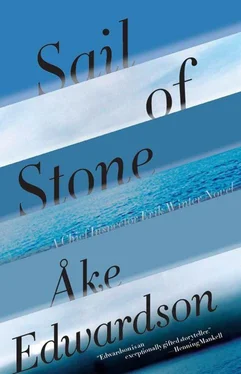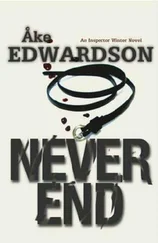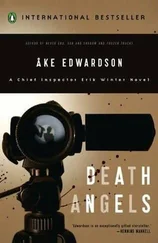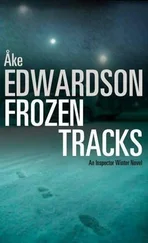“I understand,” said Winter.
“We have a bulletin out on the car, of course,” said Craig. “It will probably be found somewhere in the area, cannibalized, as usual.” He paused. “Naked, as we say.”
“The dead man,” said Winter. “How long had he been lying there?”
“The doctor said forty-eight hours the last time I spoke with him, within six hours either way.”
“Could he have been moved to where he was found?” asked Winter. “Could he have died somewhere else?”
“No,” said Craig. “We’re quite certain that he got to the place where he died on his own.”
“Then the question is why,” said Winter.
“Isn’t it always?” said Craig.
“Yes. The big question.”
“Steve told me that we would end up there sooner or later if I talked to you,” said Craig.
“Steve? Steve Macdonald? You know him?”
“Yes. We worked together for a while in Croydon. He put in a good word for me when I was trying to get the position as chief inspector up here.” Craig paused. Winter heard something that could have been a short laugh, dry as sand. “I don’t know if I should thank him or not.”
There was a drop of warmth in Craig’s voice. Winter couldn’t help but smile. He had gotten a lesson in Englishness. Craig wasn’t the one who’d started this conversation with talk about their mutual friends. It was also a question of being professional, of course.
“What do the witnesses say?” asked Winter.
“Well, what I said before, more or less. He had acted confused, as though he didn’t really know where he was. He had said things… it seemed like he was asking questions; that was the impression one person had gotten from him. And the pub owner. He had repeated something that sounded like the same thing, if I can say so. But it wasn’t possible to hear what it was.”
“Why not?”
“Why not? It wasn’t in English, or Scottish. I assume he was speaking Swedish, but that’s not our everyday language in Fort Augustus.” Craig paused again, briefly. “Of course this is old Viking land, but I don’t think people remember the Nordic language.”
Old Norse, thought Winter. There are many Nordic words in Scotland, words for places, other things.
“So he walked around speaking to people in Swedish,” said Winter. “He wasn’t just talking to himself? You said yourself that he seemed to be confused.”
“Well, we haven’t really asked in detail, but the witnesses have said that he spoke to them as though he were asking something.”
“Mmhmm.”
“I can’t help you there. I can certainly press them a little more about how he spoke to them and whether he might have been asking questions, but I can hardly get farther than that, can I?”
“No.”
“If worse comes to worst you’ll have to come here and test Swedish words on people,” said Craig. “I’ve heard that there aren’t so many.”
Will you tell the next of kin?” Craig had said, and Winter had said yes. That was part of his job, a much too large part. There was no practice for it in the police training, and entirely too much experience of it later.
He called Johanna Osvald’s cell but only got her voice mail in his ear. This wasn’t something you could tell someone on voice mail.
He looked at the clock and looked up the timetable for the southern archipelago. He looked at the clock again. He would make the 10:20 Skarven if he drove too fast on Oscarsleden.
Winter stood on the deck with the wind in his hair. Someone was fishing on the cliffs just behind the harbor. He had gotten a bite, or was about to: the gulls were wheeling in their own circles, screaming encouragingly to the man, who was wearing a wide cap for protection against the bird shit that sometimes fell like snow from the sky.
The Skarven moved out. No café on board. Few passengers were going out to the islands at this time of day, and at this time of year. Two months earlier there wouldn’t have been room for him on board; the archipelago boats swerved out like overloaded passenger junks in the Yellow River, brown limbs everywhere, children, strollers. Last summer he and Elsa and Angela had planned to go to Vrångö but fled the boat when they got to Brännö Rödsten. Too many people, like a sun-and-sea-and-salt-and-sand madness that seized the people of the city when the sun was at its warmest.
Madness. Winter tried to brush his hair out of his eyes and thought of something Erik Osvald had said when they met out on Donsö.
“There’s nothing wrong with mad cow disease,” he had said. He saw everything from the professional perspective of a fisherman: “We like to see one of those crazy cows on TV at regular intervals!”
Skarven went directly to Köpstadsö. There had been a strong wind out on the open sea during the journey over, as though the weather had changed. Winter could see black clouds in the west now, on their way up from the other side of the earth.
On the water down there, Erik Osvald and his three crew members were engaged in the eternal, anxious search for fish, the attempt to bring up the maximum legal amount.
There is a higher power, Erik Osvald had said, besides the Norwegian Coast Guard! It was a joke, but there was gravity to it. A higher power. If there isn’t, everything is so meaningless, he had said.
This life changes you, twenty-five years on the North Sea, all year round, all day long. It’s freedom. It’s loneliness.
It’s an old-fashioned way to live.
But we Swedish fishermen are still out one week and then home one week. The Swedes are almost the only ones who use that system, and it means that we earn less than the Danes and the Scots and the Norwegians.
And the past. He had spoken about the past: My dad went out Monday morning and came home on Saturday morning.
A life at sea until he became tired and stayed on land and listened to the weather reports when his son was out there.
Axel Osvald, if it was Axel Osvald that Craig’s men had found; if it was him, his death had been strange and tragic, strangely tragic, alone and naked next to a pitiful little lake next to another, larger lake in a mountainous inland, miles from the sea.
What had he been doing there? How had he ended up there? How had his thoughts wandered while he himself wandered up slopes and rough terrain? Winter had not been to Fort Augustus, but he could imagine what it looked like.
The sea was calm between Styrsö Skäret and Donsö. Winter couldn’t see Osvald’s modern trawler, the blue Magdalena. They were out for a new week, west of Stavanger and east of Aberdeen, hunting for whitefish. In six days they would put in at Hanstholm and go home in the afternoon with invoices in hand. But Erik Osvald would come home before that, and he, Winter, was the one who was coming with the information that would make the fisherman return home. Or how would it happen? Would a helicopter pick him up? Or would he set course for Scotland and Moray Firth and the harbor entrance to Inverness right away? Go through the canal in the city, the river Ness, and down into Loch Ness and down to Fort Augustus? No, not with that monster of a trawler. And no, because his father was lying and waiting in a refrigerated room in Inverness. His son could anchor in the harbor.
Skarven lay still, and Winter went ashore. The time was as the timetable had predicted: 10:55. The quay was empty. There were a few older trawlers out along the edge, and Winter wondered whether any of them had belonged to Axel Osvald. Or maybe had even existed in John Osvald’s time.
John Osvald both existed and didn’t exist. He had the unique phantom quality that people get when they disappear and are never found; their souls get no peace, and those who survive them don’t either.
Читать дальше












